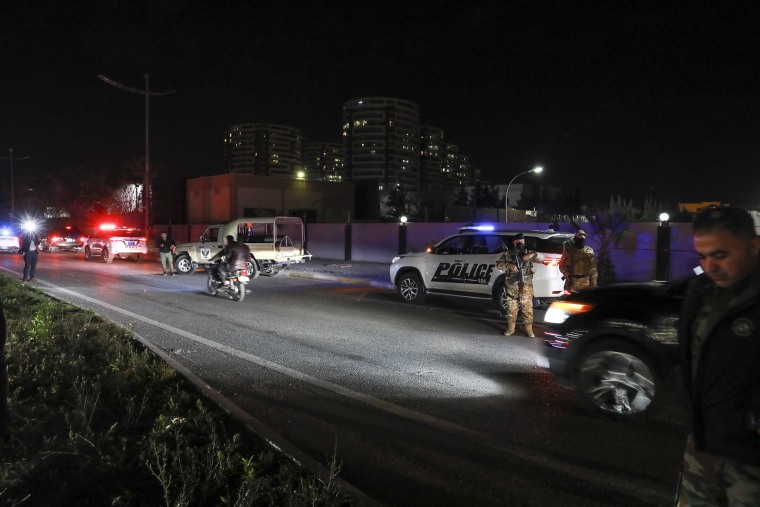A civilian contractor was killed and eight others were wounded in a rocket attack Monday at a U.S.-led military base in Kurdish northern Iraq that also left a U.S. service member with a concussion, according to U.S. officials.
The blast in Irbil was the most deadly attack to hit U.S.-led forces in Iraq for almost a year, and carries echoes of another attack in December 2019 that triggered a dangerous escalation between Iran and the United States.
The nationality of the contractor who was killed was not immediately known, but two U.S. defense officials told NBC News that the contractor was not an American. Of the wounded civilian contractors, four are from the U.S. and four are not from the U.S., according to a statement from Operation Inherent Resolve, the U.S. led military coalition in Iraq.
Download the NBC News app for breaking news and politics
"We are outraged by today’s rocket attack in the Iraqi Kurdistan Region," U.S. Secretary of State Antony Blinken said in a statement Monday night.
"We express our condolences to the loved ones of the civilian contractor killed in this attack, and to the innocent Iraqi people and their families who are suffering these ruthless acts of violence," the statement added. "I have reached out to Kurdistan Regional Government Prime Minister Masrour Barzani to discuss the incident and to pledge our support for all efforts to investigate and hold accountable those responsible."
State Department Spokesperson Ned Price on Tuesday condemned the attack and addressed the possibility of Iranian involvement.
"We are supporting our Iraqi partners in their efforts to investigate these attacks — whether they were conducted by Iran, whether they were conducted by Iranian backed militia forces or elements of such forces — we're not going to prejudge that," Price said during a press briefing.
"But suffice to say two things: One, we will in coordination with our Iraqi partners reserve the right to respond at a time and place of our choosing. And we will do so in coordination with our Iraqi partners."
The rocket attack raises tension in the region at a time when Washington and Tehran are trying to find a way back to the Iran nuclear deal.
The central government in Baghdad said it was forming a committee with the Kurdistan Regional Government to investigate the attack because it believes the rockets were launched from an area that’s not under the control of the Kurds, according to a senior security official who spoke to NBC News on condition of anonymity because he was not authorized to brief the press.
He did not specify whether the area was under the control of government forces or any other Iraqi faction, such as the Popular Mobilization Forces, an official group of Iran-linked militias.
The Kurds are among the largest stateless ethnic groups in the world, concentrated in area straddling Turkey, Iraq, Iran and Syria. In Iraq, the Kurds have established a self-rule zone in northern Iraq where they have autonomy from the Iraqi government.
Kurdish security sources said at least three rockets landed near Irbil International Airport in the autonomous region late at night. U.S. troops occupy a military base adjacent to the civilian airport.
A statement from the Kurdish interior ministry said that around 9.30 p.m. local time (1:30 p.m. ET) several missiles hit Irbil International Airport and residential neighborhoods in the city, killing one person and injuring eight others, including five at the airport and three others in the city.
Following the attack, a Kia vehicle was found between Irbil and Al Kuwayr loaded with several missiles, according to the statement.
Sabreen News, a local outlet linked to Shiite militias, reported overnight that Awliya al-Dam militia had claimed responsibility for the attack. The militia is a little known group that was formed last year but is widely believed in Iraq to have links to the Iranian-backed militia group Kataeb Hezbollah.
NBC News could not independently confirm that the group claimed responsibility for the attack or that it has links to Kataeb Hezbollah.
Kataeb Hezbollah was blamed by the U.S. for a rocket attack on K1 base near Kirkurk in northern Iraq in December 2019, that killed an American contractor Nawres Hamid, 33, and set off a dangerous escalation between Iran and the United States last year.
The rocket attack prompted American military strikes on weapon depots that Washington said were linked to Kataeb Hezbollah. Those strikes in turn triggered protests at the U.S. embassy in Baghdad and were later followed on Jan. 3 2020 by a U.S. airstrike that killed a top Iranian general, Qassem Soleimani, and Abu Mahdi al-Muhandis, a leader of the Iran-backed militias in Iraq, of which Kataeb Hezbollah is a member.
Iran then retaliated days later by firing more than a dozen ballistic missiles at two Iraqi air bases housing U.S. forces.
Reuters and The Associated Press contributed to this report.

